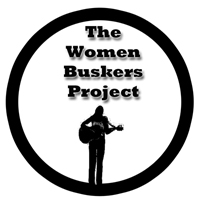
This article consists of three women buskers' answers to a set of interview questions about the topic of busking. The interviewer, and author of this article, Kirsten Anderberg, has been a busker for over 30 years. The article is organized with the question being posed first, then all three women's answers following each question. This organization allows the reader the most thorough means of comparison between the women's answers. There is so little documentation of women buskers' lives, throughout history, it is a void; I offer this article as one in a continuing series of women busker interview articles to try to at least leave a record of contemporary women street performers for future generations to enjoy.
The women buskers interviewed in this article are Maya Fink from Sweden (whom the author, K.Anderberg, busked with in New Orleans in 1984); Linsey Lindberg from the U.S., and Sylvia Sir Shiva from Croatia, Šibenik. The women will be referred to by their initials in the answer sections of the questions below. The women in this article answered these interview questions in Fall 2013. For more interviews with women buskers, visit The Women Buskers Project.
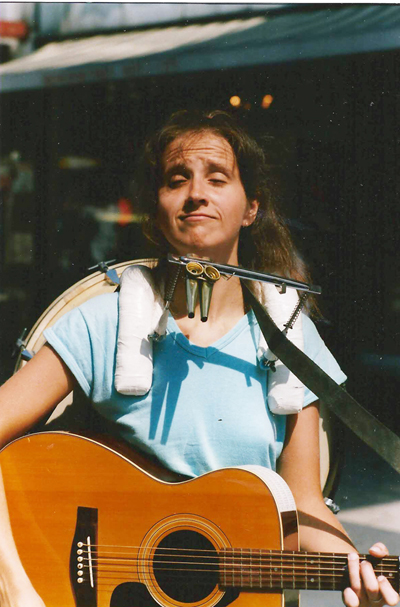
Maya Fink, performing as a one woman band in Stockholm, Sweden, in 1986
1 - How long have you been a busker?
MF: Since the last time I busked, I have considered myself only semi-retired and only temporarily so. Somewhere deep inside I feel I will someday return to the streets to express myself. Between the years of 1980 and 1998, I was actively busking, either playing the guitar and singing only or as a One-Woman-Band. Before I started busking myself I was a bottler, passing the hat for many other buskers.
LL: I've been busking for 7 years.
SSS: I have busked about 7 years.
2 - How and where did you start street performing?
MM: I started busking in Stockholm, Sweden. Having grown up with courtyard musicians coming to the area where I lived as a small child my interest in city busking seemed inevitable when I began to explore the city on my own as a teenager. By hanging around some of these buskers I eventually became acquainted with them and further down the road I started working with them as a bottler (money collector) until one day I decided to become my own boss and start busking myself.
LL: My first pitch was in Toronto on Queen Street on the first lovely spring day. It was a sidewalk pitch on a busy street. I made my own street show because I had just moved to Canada to study aerials and clown after not being accepted into 2 French circus schools. So instead I made my own way into Canada and took a clown workshop at the Zero Gravity space with clown master teacher Sue Morrison. At the workshop I met a few local buskers and realized it was an amazing opportunity to perform and not be dependent on someone giving you permission or saying you're "good enough" to be an artist. If your show was bad, you'll see it in real time. But if your show was great you'll see it in the hat! It seemed like an amazing opportunity to grow as an artist. A FULL account of my first show is told on Busker Hall of Fame in Episode 22 - http://buskerhalloffame.com/busker-hof-22-linsey-lindberg-episode.
SSS: I started local, joining local drummers at first.
3 - What is your busking act?
MF: At first I just played the guitar and sang. Then I built my own One-Woman-Band band which consisted of a big bass drum on my back, guitar, kazoo, tambourine, and singing.
LL: I perform as a legitimate Strong Woman. I do amazing feats of strength like bending metal bars, crushing apples with my biceps, and ripping entire telephone books in half with my hands all while effortlessly sharing a message of empowerment for people of all ages.
SSS: I performed solo on djembe.
4 - Do you think there is any difference between being a male or female street performer?
MF: Yes, and No. I think there are both differences and similarities. The main thing in common for the male and female busker is that they are both out there trying to express themselves their own way and to somehow make a living. I'm sure different individuals, male or female, will have experienced different differences. The one that I experienced the most was how I as a woman (or was it merely my personality?) seemed to end up in less physical trouble than my male counterparts. I was never handcuffed by cops nor challenged into fist-fights by drunks. In fact, when trouble did occur for me there always seemed to be some lovely co-citizen who would step up and help me out.
LL: I think men and women can get away with different types of jokes and posturing within shows, but in essence a good performer is just a good performer. To be a successful street performer you must have guts and charisma, same for men and women.
SSS: I suppose there is a difference, my experience is almost always greatly positive being female busker.
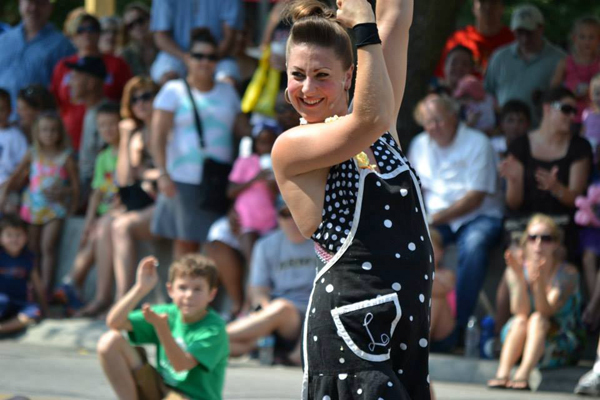
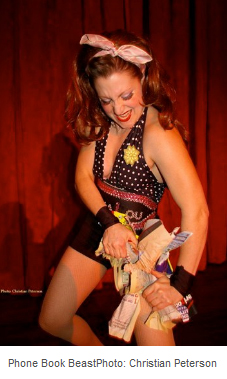
Linsey Lindberg, aka "Mama Lou: American Strong Woman," performing her "strong woman" act
5 - Why do you think there are so few women street performers (as compared to men)?
MF: Probably for the same reason that there in general are fewer women than men in the entertainment business. Historically women have been socially trained from childhood to be 'cheerleaders' - to be on the side, adoring men 'doing something'…And in such cases where the women were indeed adored themselves, this most often was as cute little sex objects rather than independent and strong acts of performance. Little seems to have changed over the years in regards to this.
LL: That's a tough question - I'm sure it is a multi-faceted issue. I've recently been reading The Feminine Mystique by Betty Friedan and if we look from the lens of women and their pre-prescribed roles in society it would seem that women are told that to 'be' feminine means to focus one's attention on feminine selflessness, beauty/desirability, and attracting a husband. To focus on self and a one's chosen goals is considered a selfish choice and one that is still difficult for women to make. Living a busker lifestyle, the female puts herself in the hot seat - forced to face her inevitable failures, public danger & shame, giving up a standard lifestyle, and choosing the risky path of discovering her true self's identity. It's a difficult choice and I think there is something to be said for Friedan's notion that we train our girls to avoid this path and instead go for the easy route of self-annihilation vis a vis the "family". That's ONE perspective.
But, I also think what we see becomes reality. As in, if there are only a handful of female buskers in the world doing shows, the less often a girl in the audience has the opportunity to identify with a female performer and think, 'Hey! I could do that!', which is what I hear from a lot of male buskers who saw shows from the audience and then decided that's what they wanted to do with their life. Currently it seems there are more women than ever on the street and the current female buskers who have a unique feminine energy and embrace a feminine form of street arts are the role models for the next generation - girl buskers beget new girl buskers just by being a visible example that busking is a viable option for women.
SSS: I don't know why are so few of us, especially solo female buskers. Could be that they don't have guts. Another reason, in my opinion, is that one has to be at least original, if not a great musician, juggler, dancer or whatever, in solo show.
6 - What is the most inspirational busker act you have ever seen?
MF: I must say some of my early life street-heroes - Don Partridge (European King of the One-Man-Bands), The Strolling Bones (a group of singing comedians active in Sweden ca. 1974-1984), and Phil Free (grandpa character with Vaudeville in his veins to make him the most all-rounded busker I've met).
LL: Mario - Queen of the Circus. I love how it is in essence a juggling show, but because he is ballsy enough to go there he wears a Freddy Mercury costume, is sexually confusing, his jokes are unique and abrasive, and he does a crowd surf as his finale. Amazing stuff.
SSS: I don't have other inspiration, besides me. Musical technique is something else, nothing to do with busking. Inspiration for this, I catch from other djembe masters.
7 - What is the worst busking act you have ever seen?
MF: I can't remember, and even if I could who am I to judge…
LL: The worst/best busking act I ever saw was a foreign guy named Bob. He did a style of martial arts which included strange tricks like swallowing small metal balls and making them come out of your eyeballs, lifting a bucket of water from the end of a swallowed knife, and an escape within a covered enclosure. Bob had some fantastic tricks but had no idea how to busk. He asked people for the change in their pockets and got exactly what he asked for. Most of his English consisted of the phrase, "ok, ok," which he said continuously to the confused crowd, right before he would produce a metal ball out of his eyeball. The women would wretch and the crowd would leave. Poor Bob. He worked harder than anyone.
SSS: The worst? It could be gypsy style; half "playing," half asking for money. My opinion about good busking is very classy, and these years I find only few I stopped and listened and tipped. One of them is (now colleague of mine) is a juggler with fire sticks, whips, swallowing fire, etc.
8 - What is your favorite tip ever received?
MF: How do I pick…so many interesting ones…the Santana ticket, the pair of winter gloves, the steak straight from the butcher's next door, the first big paper note, a kiss on the cheek from a bus driver who parked his vehicle full of riders to come out and give me his tip…and so many more.
LL: $50 Australian from a little old lady who came up to me after my show in Fremantle and shook my hand. She said she had watched twice and really loved it. As she handed me the money with a look in her eyes that let me know how much that money meant to her, she smiled and said, "Keep on doing what you're doing."
SSS: My biggest tip, as I recall, was 20 euros, but my favorite kind of tip is when people stop and listen. Interaction with kids is also my favorite, and often I get them to play my djembe for a couple of minutes.
9 - Would you want your own children to busk? Why or why not?
MF: If that's what my daughter wanted to do, YES. If the person is a person and busker of integrity, busking can be one of the most honorable and honest jobs that possibly exist in this world of commercialized 'fakery.'
LL: Sure, why not? Being a good parent means teaching your child to be independent and self-assured. Busking promotes these qualities and more. One of the best compliments a friend ever gave me was, "No matter what happens, you will never starve." I loved that. She's right and there is something that allows me to take bigger and bolder risks to fulfill my dreams when I know that I have all the skills I will ever need to get me by.
SSS: Don't have kids, but if I did, playing together would be completely awesome, if it would be kid's desire, of course.
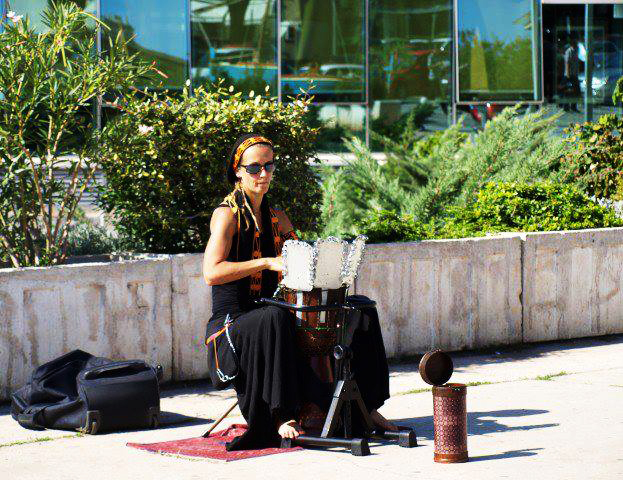
Busker Sylvia Sir Shiva performs...
10 - What is the hardest part of busking? Getting or holding a pitch due to aggressive fellow buskers? Hatting the crowd? Hecklers? Street people, store owners or craft booth vendors bothering you? City regulations oppressive?
MF: As with any job, many things that are part of the trade could be difficult and could also vary from person to person. When I was the most actively busking one of the difficult aspects of busking for me was to find a spot quiet enough for my singing voice and guitar strumming to be heard yet where the beating of the drum did not 'overtake' the surroundings. Also I sometimes had problems with other buskers giving up on being acoustic performers. When they instead gave in to society's pressure of becoming louder than really needed, to attract an audience from further away, they participated in the escalation of city noise, being part of the problem rather than the solution. For buskers sticking to traditional acoustic ways this created a problem. Tension between acoustic and amplified buskers arose and community feelings dwindled.
LL: The hardest part of busking is getting to know the social differences in the pitches all over the world. Learning to read the non-verbal cues audiences with different value systems and humor than yours takes a lot of attention and being tuned in with the audience you are trying to connect with. What's amazing is when you get it! When you crack a pitch and start having great shows somewhere where you've struggled for any number of cultural reasons. The hardest thing also becomes the best thing when you break through it.
SSS: I'm from Croatia,and the busking scene is very small in all (musicians, jugglers, etc.), so I never had big problems with pitches that I remember. No extra problems either with shop owners, people who live near by, never got attacked, extremely assaulted, nor got watered from a window above. Police officers are professional, so the worst I get from them is, "We got a call, can you please move to another pitch?" I do get rolling eyes or mumbling in chin, but all in all, that's it.
11 - What advice would you give young women buskers just starting out?
MF: Seriously and deeply question others and your own relationship to Patriarchal thinking. Carefully consider the act you create and its implications. Do you want to be part of improving the status of women in society by having an act with integrity or is it more important to you to have mainstream popularity and monetary success? Be aware of the thin line between the two … Follow your heart but don't forget your head.
LL: Same advice as I would give any busker - if this is something you really want to do, don't quit just because it's hard. You will be awful for a long time. Enjoy it. Give yourself permission to be awful. If you don't fear failure you will be able to create something uniquely YOU rather than just trying to be a carbon copy of someone else you've seen who works. Just focus on you. Create something special. You'll be proud of yourself in the long run.
SSS: I don't know…I know what worked for me, but I was always an amazon "savage," and I went out and started, slowly improving performing, quality, good clothes, recognizable, and chin big as boots.
12 - What differences have you experienced between different nationality busking acts (such as, are European buskers different than U.S. buskers, etc.? Have you noticed any differences between male and female busking acts?
MF: More of the European buskers I know live the lifestyle of the traditional European minstrel whereas many of the US buskers I know stray off from this norm towards either 'bummery' or 'commercialization.' This goes for both male and female buskers.
LL: I'm going to abstain from answering this question.
SSS: During tourist season, I busk in small, small towns in Croatia; the rest of the year I travel around the country busking in cities. I don't go wide, I like to busk where people know me ("good to see you in my town again"), having in mind not to be anywhere more than a few days and not often during a year. Never busked in USA. Busked a lot in north part of Italy, a little bit in Austria and Germany. I was warned by fellow buskers (Italians) I would not earn good money because single djembe players are not something wealthy Italians like, but my experience proved quite different. My tips would reach a couple hundred euros per day. 15 days of Italy tour, 2011, during Christmas, was enough to relax 3 months of winter.
13 - Have you ever had to busk to be able to eat? Have you ever relied on busking for your rent? Did that make busking harder?
MF: Oh, yes. That is what I mean by 'living the lifestyle of the traditional European minstrel,' that you don't just come out to perfect your act while waiting to find a more glamorous and lucrative venue to perform at. To rely on busking for food or rent is no harder than life is for the average 'normal' worker living from paycheck to paycheck. I lived like this for years until I learned that the only way to get ahead was to find a way to put away a small percentage of what I made when I made it for a rainy day. When having a bit of back up money, it's easier to relax when going out busking.
LL: Yes. When I lived in Seattle I had come to the end of my first year busking and I had come to the end of my savings. And it was TOUGH moving from the lovely Canadian audiences to an American street. I realized that I was getting angry at my audience more often because I knew I needed these shows to pay my rent and I knew these audiences weren't making it easy on me! Eventually I decided to take a step back, reinvent my love of the street, try some new forms, and essentially go back to letting it feel artistic and freeing rather than letting it control me. If you are getting bitter and angry at your audience it's time for a break.
SSS: Yes, I had to busk for food and for rent. The difference between then and now is that I'm more organized in money, for winter, rainy days, etc. I do workshops, private djembe lessons, occasional gigs, and sell handmade agave drums, yet about 80% of my income is busking, and I cover my life costs with that. No, it didn't make it harder, it never happened. I'd come home with less than a day's payment of average salary. Busking is a job more than anything else. In every place, I keep coming back, knowing how much money will be at the end. According to that, I can make financial plans in advance. My busking lasts about 80-90 minutes. It can be twice a day; morning and afternoon, never same pitch.
14 - What is the weirdest place/time you have ever busked in?
MF: I'm not sure it's the weirdest place and/or time but it's certainly one of the weirdest…I was busking on Powell Street in San Francisco on a grey and slow day when a man put a twenty in the case. He stayed around and listened for some time before he approached me between songs and presented his idea. He handed me a hundred and asked me to come play at his local bar as they were having a party there. I was a little apprehensive about this as I would be hanging out in a bar in the heart of the Tenderloin late at night. But as the man promised me another hundred when I'd show up and the ok to also pass the hat as I played I accepted the gig of 'busking in the bar.' As I arrived the man immediately handed me the other hundred. I was already thinking of my return home late that night and went to the loo where I put a hundred dollars under each foot inside the socks. As I spent the evening playing I forgot about the money I was stamping on and it wasn't until I came home and took my shoes and socks off that I was surprised. I pulled out two absolutely drooping wet hundreds to add to the hat contents of almost another hundred. Great day...
LL: Just for fun one Christmas, I was home visiting my family and I convinced my ex-husband to go out on the street as singing, dancing Christmas Elves! I played Uke and sang holiday songs and he danced his silly elf ass off! We handed out candy canes to kids, took loads of pictures and just generally had a wonderful time.
SSS: Weirdest in what sense? I can tell an unusual and nice story, how one old and well -known band saw me on the street in the capitol of Croatia (Zagreb). They invited me to their studio, and I did several big concerts as a busker-guest on djembe. Beautiful thing about this is, when the lady singer announced me, she spoke a minute or two about buskers, and how everybody should give more attention to them. This news was followed with national TV and newspapers. What is more inspiring than playing in front of thousands of people is good words about buskers, and now and then, people still approach me while busking, saying they saw me on this or that concert, and how wonderful it was.
15 - Is there anything that would make you think of stopping busking?
MF: When I was actively busking I never considered stopping and I certainly never made a conscious decision to do so. It was more a gradual need to grow as a person in other directions for some time. This in turn has made me follow the cosmic circle which perhaps one day will lead me back to active busking.
LL: I stopped for a while when I lived in Fayetteville, North Carolina. I once crashed a downtown festival and pulled off a show or two before I got shut down. It was a fun show, but there was just nowhere to do it and be anonymous. I didn't care enough to fight the system there so I just stopped. But not forever…Now I live in Austin, TX and I'm itchy to break in some new pitches. Can't keep a street performer off the street forever!
SSS: I do gigs, but no gig can ever replace busking. Often I make more or the same money on the street. Freedom of what you will play, not what is good for a club or pub, is not comparable. I want to be a djembe/percussion composer and have my own school for teaching. Even so, I think busking will continue as a irreplaceable way to show material. Festivals, street festivals, medieval festivals, music festivals…are not comparable to busking either for this simple reason: there is a schedule, time and pitch. Busking is the most free concept, and it is meant for souls like me.
You can contact Maya Fink, One Woman Band via email at buskeratheartATgmail.com (replace the word AT with an @ sign)
You can visit Linsey Lindberg's website at www.strongwomanshow.com and also check out her blog!
Sylvia Sir Shiva can be contacted via www.facebook.com/ulicna.bina
For more women busker interviews/articles, visit The Women Buskers Project!
Thank you to Resist.ca for hosting this website!




